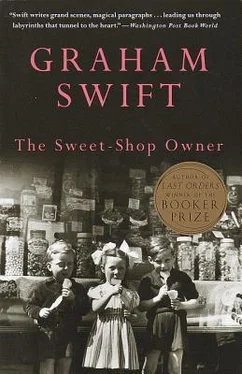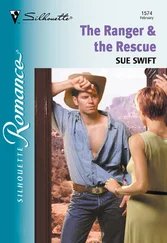Graham Swift - The Sweet-Shop Owner
Здесь есть возможность читать онлайн «Graham Swift - The Sweet-Shop Owner» весь текст электронной книги совершенно бесплатно (целиком полную версию без сокращений). В некоторых случаях можно слушать аудио, скачать через торрент в формате fb2 и присутствует краткое содержание. Год выпуска: 2012, Издательство: Vintage Books USA, Жанр: Современная проза, на английском языке. Описание произведения, (предисловие) а так же отзывы посетителей доступны на портале библиотеки ЛибКат.
- Название:The Sweet-Shop Owner
- Автор:
- Издательство:Vintage Books USA
- Жанр:
- Год:2012
- ISBN:нет данных
- Рейтинг книги:4 / 5. Голосов: 1
-
Избранное:Добавить в избранное
- Отзывы:
-
Ваша оценка:
- 80
- 1
- 2
- 3
- 4
- 5
The Sweet-Shop Owner: краткое содержание, описание и аннотация
Предлагаем к чтению аннотацию, описание, краткое содержание или предисловие (зависит от того, что написал сам автор книги «The Sweet-Shop Owner»). Если вы не нашли необходимую информацию о книге — напишите в комментариях, мы постараемся отыскать её.
The Sweet-Shop Owner — читать онлайн бесплатно полную книгу (весь текст) целиком
Ниже представлен текст книги, разбитый по страницам. Система сохранения места последней прочитанной страницы, позволяет с удобством читать онлайн бесплатно книгу «The Sweet-Shop Owner», без необходимости каждый раз заново искать на чём Вы остановились. Поставьте закладку, и сможете в любой момент перейти на страницу, на которой закончили чтение.
Интервал:
Закладка:
How little you know me, Willy. How little you know of that young girl (I wasn’t yet fourteen) who looked at herself once in the bedroom mirror — the spring night was warm and I’d slipped off my cotton nightdress — and knew that she was beautiful. You think that’s what every young girl wants? Something to rejoice over? I had eyes like blue embers and little breasts that pointed at me. But it’s not like that. It’s like being chosen. It’s like being told (that other figure, in the mirror, seemed to tell me): You’re special. You must cherish your gift.
That was in ’27. I was young. All I knew was that Father had a business and my elder brothers were going to go into it; and that my mother’s brothers (how Mother egged Father on in that business of his) had all been killed, one, two, three of them, in a war I was too young to recall. I pictured them like skittles, those would-be uncles of mine. Uncle Mark, Uncle Philip, Uncle Edward. Bright painted skittles, all suddenly knocked down (it said in the Book of Remembrance they were ‘fallen’). And later I learnt — it was a common fact so nobody mentioned it — that everywhere there had been knocking down, great gaps and holes everywhere, families with only one or two skittles left standing.
But that was in the past. They talked of Trade and Opportunity, Recovery, the Fruits of Peace. They wanted to forget history. They wanted new life. And when in the school holidays I returned from little educational outings with my girl-friends, to Greenwich, to the Crystal Palace, I felt the eyes of men in the High Street, still standing skittles, waiting at tram queues and outside pubs, turn to look at me. Life, their eyes said, and I felt their message lap around me like waves.
Drink your tea. Be still, think of nothing. It was like something allocated in error, that image in the mirror. When I walked down the High Street with my girl-friends, Joan Proctor, Betty Marshall, Carol Smith, all of whom had thankful little marks of plainness, little blemishes and flaws which relieved them of responsibility, I knew I couldn’t laugh out loud, giggle and squeal like them. I held my head and shoulders stiffly like a puppet. They called me ‘beautiful and proud’, sulky, hard-to-please, and they blamed me all the more because, having beauty, I should also have grace. But they didn’t see how I cowered inside my looks like a captive, how my looks didn’t belong to me, and how, when they thought me haughty and peevish (what else could they think, seeing only what I saw in the mirror?) I was really helpless and afraid.
My family nursed my beauty like a rare plant. For it had its uses after all. They set me up into a little emblem, carried me before them like a banner, so they could say, Look, even beauty is on our side. And I knew I was responsible. Father would come home, tired and indignant-looking, in the evening. He was indignant because there was going to be a Labour government. He wore heavy coats, and a scarf wrapped tightly round his neck as if he were always cold or ill (though it was Mother who had the chest trouble) and his face was set and lined as if nothing was more weighty, more pressing than the burdens he bore. Yet he would look at me as if the sight restored him. Mother would say, ‘Look your best for Father’, and when I became a certain age she bought me new under-clothes, a little white shapeless brassière like a pair of ribbons, and spoke to me earnestly and sharply, yet never quite plainly, of girls needing to be pure, of the duty of keeping one’s purity. I never quite knew what it meant: purity. Perhaps it had something to do with the clean white sheets my family laundered — ‘Pure’ it said on the handouts given to customers and stuck in windows, ‘All your laundry fresh and pure’. Perhaps it had something to do with those dead brothers of my mother, engraved on the white war memorial. ‘Their deaths have purified them,’ somebody said of all those skittles. I only knew it was another of those things they looked to me for — pure, beautiful — and which I couldn’t provide.
A second cup? Let me pour you a second cup — I’ll put it near. Lean back. I’ll stroke your brow — no, don’t look at me. Lightly, lightly. There. That’s better. You are already beginning to look again as you did on the common when I said, ‘Why don’t you?’ — and straight away, you did.
How different you are from my family, Willy, from Jack and Paul. Their bodies are agile and eager, their faces keen and lifted, and yet they are stiffer, stiffer and hollower than you, with your woodenness and your glum expression. They have the looks of statues, trapped in immovable poses, and they already show signs of Father’s indignation. They think a lot of purity. On the wall in the office, over the laundry, someone has pinned the motto ‘Cleanliness is next to Godliness’ and they do not see it as a joke.
There are wicked types, said my mother. Her face was always harsh. Wicked things; better you should never know. But that didn’t stop her, or the rest of them, when the time came, from giving their encouragement to Hancock. He was a good sort, they said. He drank with Paul and Jack at the Sports Club. He was good at squash and tennis and drove a green Riley Lynx. And, what was more important, old Jones had taken him in; old Jones who’d served us well and had a sound business and couldn’t work on much longer. No, they didn’t discourage Frank Hancock. He was tall, springy-stepped, with the air of a participant in some competition. He took me out like a boy on his best behaviour, as if I should reward him in some way. And when he pulled me into the hedge on the way back from a drive to Brighton (how sickly the grass smelt and the stems of cow-parsley) I did not assume it was wickedness at first. He looked at me as if I should have expected this. He pulled up my clothes like a man unwrapping a parcel. ‘All right,’ he said, ‘all right, now’, as if we had both been anticipating. I struggled. The sun was in my face. This was like a performance in which people were really stabbed and wounded. He needed his victory. And afterwards, in the green Riley — it was a careless evening in June with sunlight through trees — his face, watching the road, terrified me. I only knew I wasn’t prepared. Life, life.
Lie still Willy. Don’t look up. Think of nothing.
I spoke to Mother. I used the coy evasions she would have used. ‘He was not good to me.’ ‘What nonsense,’ she said, ‘a nice young man like Frank’ (for old Jones had just been visited by the doctor). And I knew I’d failed them. And not only them, but myself. For I couldn’t go near the grass or lounge in the sunlight without suffering. I had my first asthma that summer. I was scared I was pregnant, but I wasn’t. My eyes were red, my breath strained. Father looked displeased; how it spoilt my looks. And down at the Sports Club Paul and Jack played squash with Hancock and stood him beers (because he always won) and said what a fine fellow he was. I went out with him again in his green Riley, with preparatory handkerchiefs tucked in my sleeves. I knew what he wanted, with his lean sportsman’s body and his prize-seeker’s eyes: the figure in my bedroom mirror. But it wasn’t mine to give. I even felt sorry for him, that fine fellow who couldn’t get the thing he wanted. How innocent maybe he was. Oh, I restrained him. I learnt there is a sort of command in beauty even though inside you wobble like a skittle. Lie still Willy. Though it only perhaps encouraged him all the more, that disdain. How you pay, Willy, even for the things you never own.
‘What nonsense.’ I had refused to see Hancock again. I lay in my room struggling for breath. ‘Ungrateful!’ they said. ‘Pull yourself together! What will Frank do? What nonsense!’ There in my bedroom mirror I saw almost with relief the red blotches on my skin, and watched my face contort as I gasped for air. I locked the door. Their voices insisted outside. Then one day I smashed the mirror.
Читать дальшеИнтервал:
Закладка:
Похожие книги на «The Sweet-Shop Owner»
Представляем Вашему вниманию похожие книги на «The Sweet-Shop Owner» списком для выбора. Мы отобрали схожую по названию и смыслу литературу в надежде предоставить читателям больше вариантов отыскать новые, интересные, ещё непрочитанные произведения.
Обсуждение, отзывы о книге «The Sweet-Shop Owner» и просто собственные мнения читателей. Оставьте ваши комментарии, напишите, что Вы думаете о произведении, его смысле или главных героях. Укажите что конкретно понравилось, а что нет, и почему Вы так считаете.












